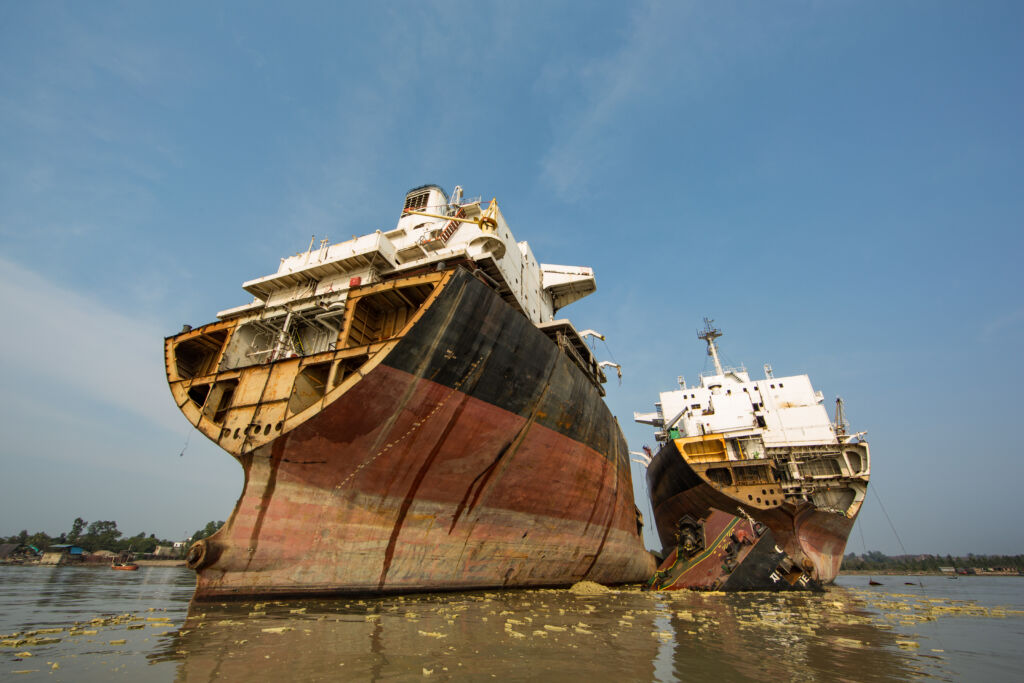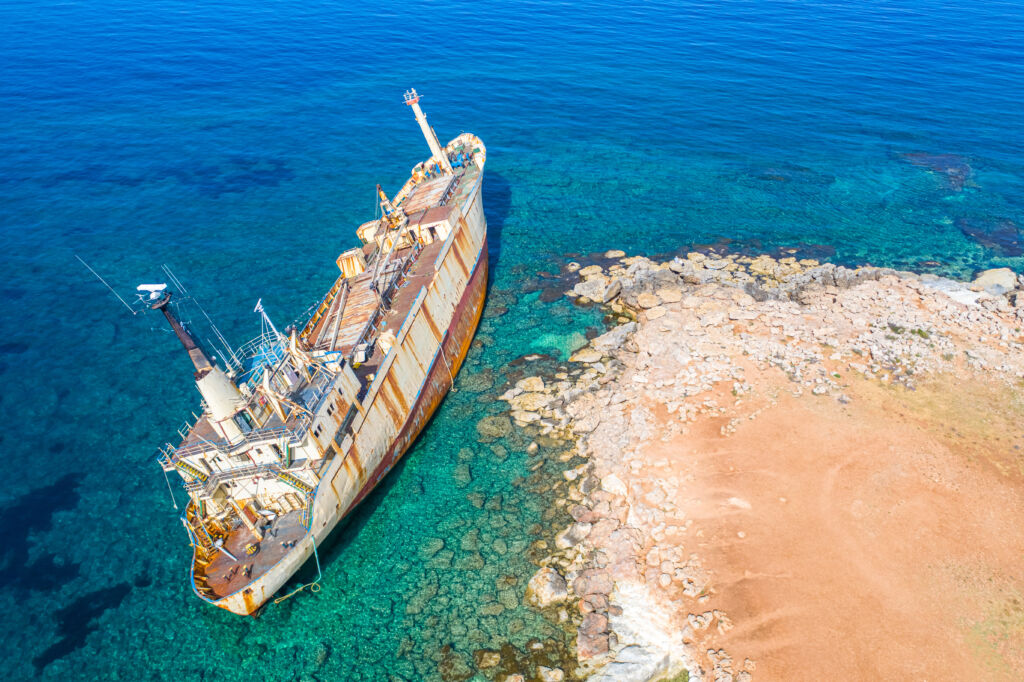
Dengue cases and deaths soar to record levels
read more

The draft law proposes creating a sustainable competitive domestic recycling market to minimise the problem of abandoned vessels and boost sectors of the economy to generate jobs, revenues and taxes
Draft Law 1,584/2021, proposed by federal deputy Coronel Armando in April 2021, aims to lay down the framework of integrated policies and guidelines to foster a safe and environmentally sound ship recycling market in Brazil to compete with facilities in other developing countries. Even though Brazil has not signed the 2009 Hong Kong Convention (HKC) on ship recycling, the pending legislation broadly adopts standards enshrined in that IMO Convention, not yet in effect, and the EU Recycling Regulation (EU SRR) of 2013.
In addition to serving the domestic recyclable tonnage, the bill strives to set conditions for Brazilian shipyards to apply to join the EU SRR’s ‘European List’ of approved facilities for recycling EU-flagged ships. Currently, a US facility is the only one listed outside of Europe to recycle ships flying the flag of EU members.
The initiative pending at the Chamber of Deputies establishes procedures and guidelines and assigns responsibilities to shipowners, shipbreakers and public authorities. It applies to national ship recycling yards, ships, fixed (when towed) and floating platforms of any flag in Brazilian territory. Navy ships and small watercraft without mechanic propulsion are exempt.
The bill is centred on the control and management of hazardous materials on ships and their safe disposal at the end of the ship’s life cycle, ensuring that recyclers meet the guidelines issued by the IMO and ILO and requirements of the Basel Convention and Stockholm Convention, both signed by Brazil, among other regulations. Its main features include:
Foreign ships may be subject to warning, detention, dismissal, or ban from Brazilian ports and offshore terminals if they fail to produce the required ship certification. In such cases, the maritime authority must inform the flag State. Those legally liable for ships and platforms are responsible for preparing to send them for recycling. They remain accountable whenever the vessels are anchored, moored alongside a berth or in shipyards.
Bill 1,584/2021 allows incentive and funding measures to meet initiatives involving the prevention and reduction of solid waste in production and recycling processes, reverse logistics systems, and research on greener ship recycling practices and technologies. The draft law also enables states and municipalities to grant tax, financial and credit incentives to industries and entities dedicated to reusing, treating, and recycling domestic solid waste generated by ship recycling.
The bill is being processed in the Chamber of Deputies. If four of its committees approve the draft, it will be referred to the Senate without going through the plenary of the lower house.
On 6 December 2022, a couple of weeks before the parliamentary recess, the bill passed the third committee without amendments. Now, the Constitution, Justice and Citizenship Committee will review it. From there, it will be forwarded to the upper house for discussion and approval and then submitted for presidential sanction.
If sanctioned, the new regulation will be enforced from January following its ratification, with some devices coming into effect from January of the second year after the law’s enactment.

Unlike shipbuilding, shipbreaking is a stable industry, even in times of global market decline, when more ships are scrapped before the end of their service life to eliminate maintenance costs. Almost 90% of the material extracted from demolished ships is recyclable, the United Nations Conference on Trade and Development (UNCTAD) estimates.
The UN intergovernmental agency reported that over 96% of the world’s ship recycling tonnage sold in 2021 (15.3 million GT) was dismantled in Bangladesh, Pakistan, India, and, from a distance, Turkey. There are no relevant ship recycling facilities established in South America. When broken up, the average age of vessels was 30 years, with offshore supply ships typically lasting longer (34 years) than gas carriers (30 years). The main types of vessels above 100 GT scrapped last year were tankers (54%), bulk carriers (18%) and offshore ships (8%).
UNCTAD predicts substantial growth in global maritime trade and accelerated fleet renewal in the coming decades as the world’s cargo-carrying capacity increases and the shipping industry gradually transitions to low-emission ships.
In this context, the ship recycling market should continue to grow with the world fleet development, but not without challenges. Initiatives such as the HKC and the EU SRR require recycling companies to adopt the highest standards and implement adequate environmental, social and governance practices to be certified to operate. At once, these internationally binding regulations disqualify most of the Asian shipbreakers who now dominate the global market and are considered by the ILO and NGOs to be sources of chronic violation of international environmental and labour conventions and treaties.
Brazil has a significant fleet of platforms and support vessels serving the country’s vigorous offshore oil and gas industry. The National Agency of Petroleum, Natural Gas and Biofuels (ANP) estimates that more than a hundred platforms will be decommissioned in the next decade when they reach the end of their operational life.
The cabotage incentive program promises to increase the share of waterway trade in the transport matrix, attracting more foreign ships to carry domestic cargo on the extensive Brazilian coast and inland waterways. The current cabotage fleet has an average age of more than 16 years and is expected to be recycled over the next ten to twenty years.
Adding to the growing demand for sustainable ship recycling facilities, dozens of derelict or abandoned vessels, mainly in Rio de Janeiro, where recently a bulk carrier hit the iconic Rio-Niterói Bridge and brought the problem to public attention, pose a threat to navigation safety and the environment.
Although Brazilian shipyards are mostly modern and environmentally minded, they have not been contracted for new ship buildings due to low competitiveness in the international market and are largely idle. On the other hand, the current legal and fiscal framework hinders the development of a financially viable national ship recycling industry. It leads shipowners to send end-of-life ships for disposal abroad, incurring high transportation costs and potentially entailing environmental and occupational risks in places where shipbreakers are neither certified nor audited.
There is an emerging need to expand global ship recycling capacity sustainably. Brazilian shipyards with good practices can equip themselves to join the international market and seek inclusion in the EU SRR European List as a third country, considering it is unlikely that the HKC will come into force in the foreseeable future due to low adherence.
A new government was elected and took office in January 2023. It remains to be seen whether the newly sworn-in president and his administration will effectively support the legislative initiative and create the conditions for developing the activity safe and clean.
Please read our disclaimer.
Related topics:
Rua Barão de Cotegipe, 443 - Sala 610 - 96200-290 - Rio Grande/RS - Brazil
Telephone +55 53 3233 1500
proinde.riogrande@proinde.com.br
Rua Itororó, 3 - 3rd floor
11010-071 - Santos, SP - Brazil
Telephone +55 13 4009 9550
proinde@proinde.com.br
Av. Rio Branco, 45 - sala 2402
20090-003 - Rio de Janeiro, RJ - Brazil
Telephone +55 21 2253 6145
proinde.rio@proinde.com.br
Rua Professor Elpidio Pimentel, 320 sala 401 - 29065-060 – Vitoria, ES – Brazil
Telephone: +55 27 3337 1178
proinde.vitoria@proinde.com.br
Rua Miguel Calmon, 19 - sala 702 - 40015-010 – Salvador, BA – Brazil
Telephone: +55 71 3242 3384
proinde.salvador@proinde.com.br
Av. Visconde de Jequitinhonha, 209 - sala 402 - 51021-190 - Recife, PE - Brazil
Telephone +55 81 3328 6414
proinde.recife@proinde.com.br
Rua Osvaldo Cruz, 01, Sala 1408
60125-150 – Fortaleza-CE – Brazil
Telephone +55 85 3099 4068
proinde.fortaleza@proinde.com.br
Tv. Joaquim Furtado, Quadra 314, Lote 01, Sala 206 - 68447-000 – Barcarena, PA – Brazil
Telephone +55 91 99393 4252
proinde.belem@proinde.com.br
Av. Dr. Theomario Pinto da Costa, 811 - sala 204 - 69050-055 - Manaus, AM - Brazil
Telephone +55 92 3307-0653
proinde.manaus@proinde.com.br
Rua dos Azulões, Sala 111 - Edifício Office Tower - 65075-060 - São Luis, MA - Brazil
Telephone +55 98 99101-2939
proinde.belem@proinde.com.br